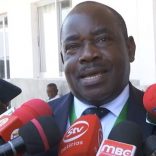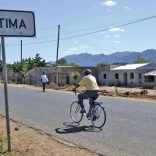Mozambique: About 60 schools reopen following terrorist incursion in Chiúre - AIM
“Hidden debts” trial: 12 October 2021 – Lusa report

Photo: O País
- Nyusi agreed to hidden-debts company – former top spy
The former director of Economic Intelligence of the Mozambican secret service said in court on Tuesday that the country’s current president recommended the creation of the Tuna Fishing Company (Ematum), which benefited from the hidden debt money.
In response to the Public Prosecutor on whose idea it was to create Ematum, the accused, António Carlos do Rosário, replied: “It was the minister of defence (at the time).
Rosário said that Nyusi agreed to create Ematum after the technical team responsible for implementing the Integrated Monitoring and Protection System (SIMP) of the Exclusive Economic Zone told the government that a company was needed with a covert mission to collect information on criminal activities in Mozambican waters.
“At the time of the threat assessment studies [in the Exclusive Economic Zone], we decided to create SIMP, and we decided to create three vehicles [companies],” said the former director of Economic Intelligence at the State Intelligence and Security Service (SISE) and former president of the three companies that benefited from the hidden debt money.
António Carlos do Rosário said that Filipe Nyusi was aware that Ematum would operate in the defence and security sector because he advised against a company from the ministry of defence – Monte Binga – joining the shareholder structure of that company.
Monte Binga was facing difficulties forming partnerships with other companies and mobilising capital due to its connection to the defence and security forces, António Carlos do Rosário said, citing the current head of state.
Faced with the insistence of judge Efigénio Baptista on the relevance of the creation of Ematum, since Proindicus had already been constituted, which also had the task of maritime security, António Carlos do Rosário stated that the fishing activity that would be developed in parallel by the company gave it better capacity and efficiency in the collection of information at sea.
The data collected by Ematum would be sent to a command centre and would guide the actions of Proindicus in activities to intercept and neutralise criminal acts in Mozambican waters.
Rosário said that part of the US$850 million debt incurred by Ematum was channelled to acquiring defence equipment but did not specify the amount earmarked for this purpose.
The former SISE boss again mentioned the name of the then minister of defence and current president of Mozambique when he was asked why Proindicus did not sign contracts with oil multinationals for the provision of security services.
The question was because Rosário systematically mentioned that its purpose was to provide security services to the oil companies operating in the Rovuma basin, aiming to collect revenues that would allow its sustainability.
Rosário said that the deal between Proindicus and the multinationals involved in the hydrocarbon projects in the Rovuma basin did not move forward because Nyusi did not order the publication in the Bulletin of the Republic of the concession contract between the government and the company.
“It was the minister of defence who had to make the publication order jointly with the minister of economy and finance and the minister of the interior. Why didn’t they do it? They never told me, but we didn’t have this ability to put [the project] on paper and start billing,” he stated.
The SISE Director of Economic Intelligence insisted that the project to protect the Exclusive Economic Zone aimed to protect national sovereignty in the face of threats to territorial integrity and weaknesses in the defence and security system.
“We had to find a way that would allow us to have the means to guarantee the security of the people, the population, the territory and the Mozambican institutions, generating revenue to ensure the sustainability of the system,” he said.
The Mozambican Public Prosecutor’s Office believes that Ematum, Proindicus and MAM were not viable and were created to take out illegal loans used to pay bribes.
In addition to António Carlos do Rosário, other defendants heard in court in the main case of the hidden debts also referred several times to the role of Nyusi in the approval of the project for the protection of the Exclusive Economic Zone, which the Public Prosecutor believes was the ruse found for getting the loans.
Given allusions to the name of Filipe Nyusi, Judge Efigénio Baptista said that the Public Prosecutor’s Office found no evidence of wrongdoing by the current head of state or his predecessor Armando Guebuza, who headed the government at the time of the alleged offences that gave rise to the current trial.
The former director of Economic Intelligence at SISE, who was also director of the three companies, is accused of having received bribes worth US$8.9 million (€7.6 million) for his role in the project to protect the Exclusive Economic Zone and the creation of the three companies.
The Mozambican justice system accuses the 19 defendants in the main case of the hidden debts of having joined a “gang” and siphoned off US$2.7 billion (€2.28 billion) from the Mozambican state – a figure that is higher than the US$2.2 billion so far known in the case – raised from international banks via guarantees provided by the government.
The so-called hidden debts were contracted between 2013 and 2014 from the British subsidiaries of investment banks Credit Suisse and VTB by Mozambican state companies Proindicus, Ematum and MAM.
The loans were secretly endorsed by the Frelimo government, led by the president at the time, Armando Guebuza, without the knowledge of parliament or the Administrative Court.












Leave a Reply
Be the First to Comment!
You must be logged in to post a comment.
You must be logged in to post a comment.